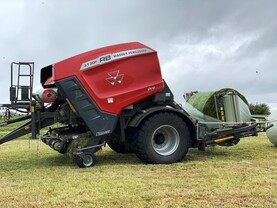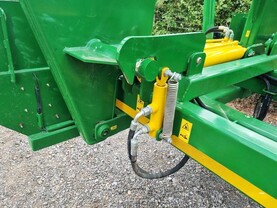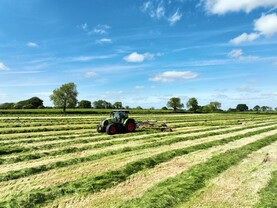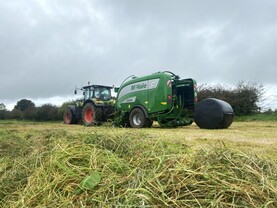For many, wrapped baled silage and haylage is one of the handiest ways of producing good-quality silage. It is crucial that the wrap is applied correctly both from a quality of silage perspective and a cost perspective.
Here Maurice Keady, who is sales manager for Irish bale film manufacturer Silawrap, tells the Irish Farmers Journal how to set up the wrapper to apply the correct number of layers over the entire bale.
Roller cleaning
The pre-stretch roller mechanism stretches the plastic by 70% before it is applied onto the bales. Tack is the glue on the film and this builds up on the rollers, especially in hot weather, according to Maurice. If there is too much tack on the rollers, the plastic slips and is not stretched as much as it should be. The dew in the evening makes it worse, says Maurice, and it reduces stretch typically from 70% back to 50%. The farmer will then have a lower bale count per role of plastic film.
How do you know when or how often to clean the rollers? If your hand sticks to the roller or rollers then Maurice advises cleaning them with white spirits.
Similarly if there are tack or dirt lines at the top and bottom of the rollers then they need cleaning. Heavy grime requires the assistance of a wire brush to clean. Also notable when the plastic slips is that the plastic film is wrinkly as it is applied onto the bale.
Greasing the pre-stretch gears
The pre-stretch rollers are geared to each other to provide the 70% stretch required before the plastic is applied onto the bale. In general, most manufacturers use two sets of gears to provide the difference in roller speeds to stretch the plastic film. Others do use plastic gears or even chain and sprocket arrangements but this two-geared mechanism is the more likely system to be found here. In Maurice’s experience, 90% of wrappers have these types of gears.
To stretch the film by 70% there is a considerable pressure on the gears and they do require regular greasing. Individual manufacturers will provide their own guidelines but Maurice advises greasing them every 500 to 1,000 bales. Failure to grease the girls will cause them to run dry and cause problems with film stretch, usually overstretching the film and wearing out the gears.
To gain access to the gear set on top of the dispenser unit requires the cover on top to be removed. This may be held in place by small bolts, clips or screws.
Number of wraps
A minimum of four layers of film should be applied to all parts of the bale. Six layers should be applied if grass dry matter is 35% or greater.
As part of regular maintenance and checks, especially if wrapping bales from different balers with slightly different diameters, it is very important to ensure that four layers of films are applied over the entire bale. Two or three layers on places could result in the bale bursting when being handled or stacked while also affecting the silage quality if not split.
Belt sag
Another important adjustment to keep both the bale turning correctly and the film applied is the adjustment of belt sag. Turntable designs differ from one manufacturer to another but the vast majority use a set of belts or one full-width belt. The belts are geared to provide a minimum 50% film overlap on the bale. Maurice points out that a machine wrapping 10,000 bales per year has had in the region of 7,500 tonnes of silage dumped on its belts. After four or five years of this the belt will certainly need tensioning to bring them back up. The film dispenser must be aligned with it to compensate for the sag. Maurice also advises tightening the belts but not so much as to cause the bale to fall off while being wrapped. After tensioning he advises to wrap slowly to see how the bale rotates in its newly elevated position.
The handler and rust
One very important and often neglected piece of maintenance required is to the bale handler. Rust on the handler is like sandpaper and will leave pinholes where the handler comes into contact with the plastic. Other blemishes on the handler where it comes into contact with the wrapped bale need to be dealt with before it handles any wrapped bales and casues expensive silage soilage.






 This is a subscriber-only article
This is a subscriber-only article










SHARING OPTIONS: